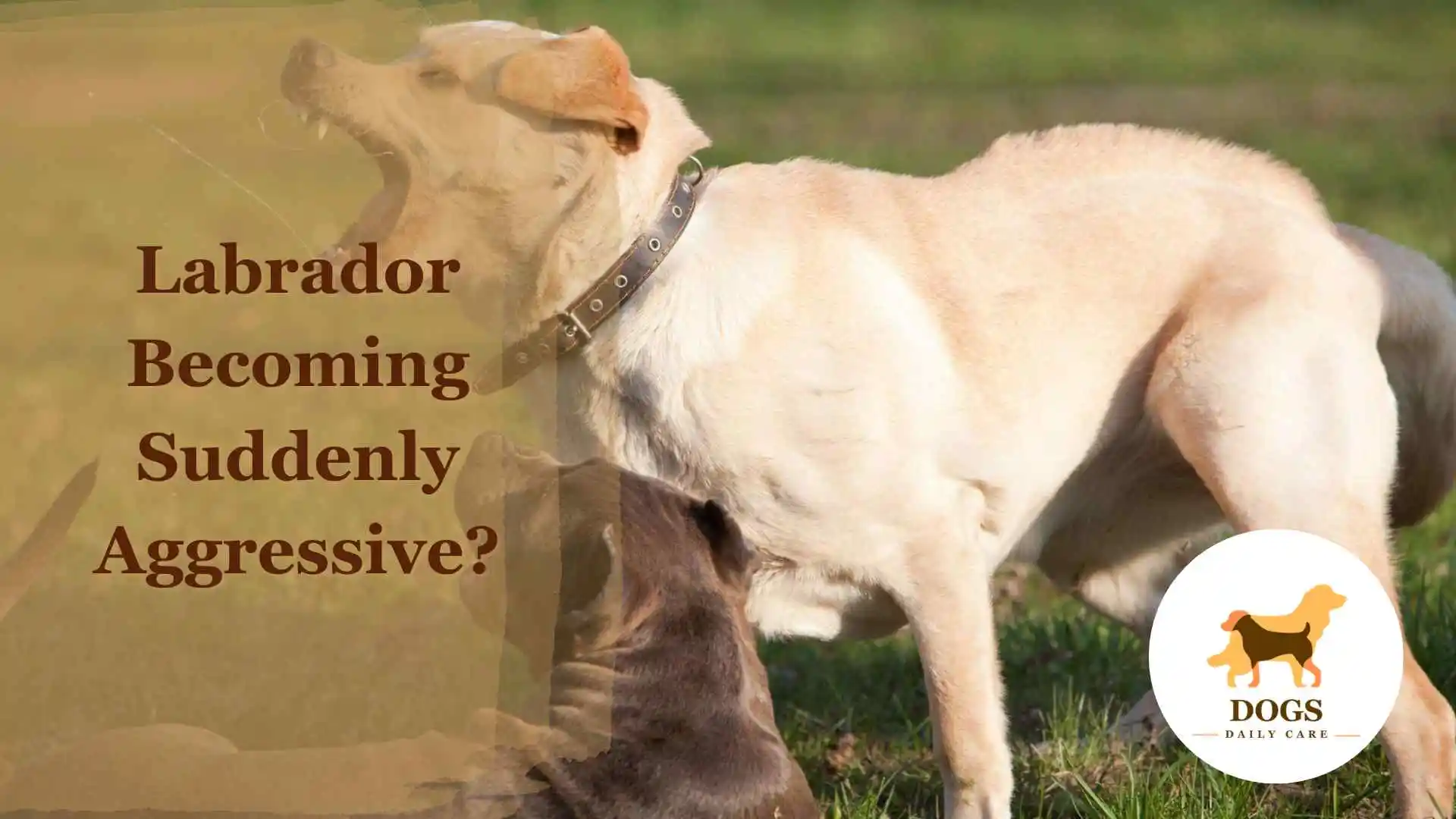Labrador Becoming Suddenly Aggressive? – Here’s What To Do
Labradors are renowned for their friendly and gentle nature, often regarded as the perfect family pets. However, when a Labrador suddenly shows signs of aggression, it can be both alarming and confusing for pet owners. This unexpected behavior shift raises concerns and questions about what might be causing such a change in a typically placid breed.
Understanding the reasons behind this sudden aggression is crucial, not only for the safety of the household but also for the well-being of your beloved pet. As Labrador owners, it’s important to recognize that aggression can stem from various sources, ranging from medical issues to environmental stressors.
In this comprehensive guide, we’ll delve into the common causes of sudden aggression in Labradors, helping you identify and address these alarming behavioral changes. Whether you’re a seasoned Labrador owner or new to the breed, this article aims to provide valuable insights and practical advice for managing and preventing aggression.
By understanding the root causes and knowing the appropriate steps to take, you can ensure a safe and happy environment for both your family and your furry friend.
Overview of Labrador Temperament
Labradors are often the first choice for families, and for good reason. Known for their friendly and outgoing nature, these dogs are the epitome of joy and companionship. They thrive on human interaction and are well-loved for their playful and affectionate demeanor.

This breed is also famous for its patience and tolerance, making them excellent companions for children. Their gentle nature is a hallmark of the breed, setting them apart as ideal family pets.
However, like any breed, Labradors have their own set of behavioral tendencies. It’s essential to understand that, despite their generally calm disposition, they are still capable of showing aggression under certain circumstances. This isn’t typical for Labradors, and when it happens, it’s a sign that something is amiss.
Acknowledging this is the first step in addressing any issues that may arise. In the following sections, we’ll explore what could trigger such changes in behavior and how to effectively manage them.
Identifying Sudden Aggression in Labradors
Recognizing the signs of sudden aggression in Labradors is key to addressing it effectively. Aggression can manifest in various ways, often starting subtly before escalating. Look for changes in body language, such as a stiff posture, bared teeth, or a lowered head.
Growling, snapping, or lunging are more obvious signs that your Labrador is feeling aggressive. These behaviors, especially if they’re new, should be taken seriously as they indicate your dog is uncomfortable or feeling threatened.
Understanding these warning signs is vital for any Labrador owner. Sudden aggression can be a response to pain, fear, or environmental stress, among other causes. It’s important to note when and where these behaviors occur. Does your Labrador growl when approached while eating? Do they snap when touched in a certain area?
Observing these patterns will provide valuable clues to the underlying cause of their aggression. In the next sections, we will explore the potential reasons behind these behaviors and how to respond to them.
Common Causes of Aggression in Labradors
Understanding why a Labrador might suddenly become aggressive is key to finding a solution. While Labradors are generally known for their friendly nature, various factors can trigger aggression. One of the most common reasons is medical issues.
Pain or discomfort from conditions like arthritis, dental problems, or internal injuries can make a normally placid dog lash out. It’s important to rule out health issues first by consulting a veterinarian.
Another significant cause is fear or anxiety. Labradors may react aggressively when they feel threatened or scared. This can be due to a bad past experience, a lack of socialization, or even changes in their environment. Protective behavior is also a factor. Labradors are loyal and may display aggression to protect their family or territory.
Lastly, environmental stressors such as loud noises, crowded spaces, or a chaotic household can contribute to aggressive behavior. Recognizing these triggers is the first step in addressing and managing your Labrador’s aggression.
Medical Concerns and Aggression in Labradors
The link between medical issues and aggression in Labradors is a critical aspect to consider. Often, a sudden onset of aggressive behavior is a dog’s way of telling us that something isn’t right health-wise. Pain is a common culprit.
Conditions like arthritis, dental diseases, or even unseen internal injuries can cause significant discomfort, leading to aggressive reactions. It’s crucial to watch for other signs of illness, such as changes in eating habits, lethargy, or whining.
Hormonal imbalances can also play a role. Issues like hypothyroidism or adrenal disorders can alter a dog’s temperament, making them more prone to aggressive outbursts. It’s essential to get a thorough veterinary check-up if your Labrador starts showing uncharacteristic aggression.
A professional assessment can rule out or confirm medical causes, guiding you towards the right course of action. Addressing the medical issue often leads to a noticeable improvement in behavior, highlighting the importance of health in understanding and managing aggression.
Dealing with Aggression: Training and Management in Labradors
Effectively managing aggression in Labradors involves a combination of training and lifestyle adjustments. First and foremost, consistent and positive training is key. Using reward-based methods helps build trust and teaches your Labrador appropriate behaviors. It’s crucial to avoid punishment or harsh techniques, as these can exacerbate aggression.
If your Labrador shows signs of aggression during certain activities, like mealtime or play, specific training focused on these situations can be beneficial.
Environmental management also plays a significant role. Creating a safe and stress-free environment for your Labrador can help reduce aggressive tendencies. This includes providing a quiet space where they can retreat, ensuring a routine for meals and exercise, and minimizing exposure to stressful situations. In cases of severe or unmanageable aggression, seeking the help of a professional dog trainer or behaviorist is highly recommended. They can offer tailored advice and hands-on training techniques to address the specific needs of your Labrador.
Remember, patience and consistency are crucial. Modifying aggressive behavior takes time and understanding. With the right approach, most Labradors can overcome these challenges and return to their loving, gentle selves.
Preventive Measures for Aggression in Labradors
Preventing aggression in Labradors starts with understanding and early intervention. Socialization is key. Introduce your Labrador to various people, animals, and environments from a young age. This exposure helps them become well-adjusted and less likely to react aggressively in unfamiliar situations.
Training plays a big role too. Basic obedience training establishes boundaries and builds a strong bond between you and your pet, which can prevent behavioral issues.

Regular exercise is another crucial factor. Labradors have plenty of energy, and without proper exercise, they can develop frustration that might lead to aggression. Ensure your Labrador gets enough physical activity and mental stimulation every day. Also, consider their diet. A balanced, nutritious diet can impact a dog’s behavior, so providing high-quality dog food is important.
Lastly, routine health check-ups are essential. Regular visits to the vet can help catch any medical issues early, preventing discomfort that could cause aggression. By taking these proactive steps, you can help ensure your Labrador remains happy, healthy, and well-behaved.
Frequently Asked Questions (FAQs) About Labrador Aggression
1. Why is my friendly Labrador suddenly acting aggressively?
Sudden aggression in Labradors can be due to various reasons, including medical issues, fear, environmental stress, or even a lack of proper training and socialization. Identifying the root cause is essential for effective management.
2. Can certain health problems cause aggression in Labradors?
Yes, health problems like pain from arthritis, dental issues, or hormonal imbalances can lead to aggressive behavior. It’s important to consult a vet to rule out these possibilities.
3. How can I train my Labrador to reduce aggressive tendencies?
Positive reinforcement training is effective. Reward your Labrador for calm behavior and avoid punishment. Consistent training focusing on specific triggers can also help. In severe cases, consider consulting a professional dog trainer.
4. Are Labradors naturally aggressive dogs?
Labradors are not naturally aggressive. They are known for their friendly and sociable nature. If a Labrador displays aggression, it’s typically a sign that something is wrong or their needs are not being met.
5. What should I do if my Labrador shows aggression towards strangers or other animals?
Start with socialization training to get your Labrador comfortable around strangers and other animals. If the aggression is severe or you feel overwhelmed, seek help from a professional dog behaviorist.
Conclusion
Understanding and addressing aggression in Labradors requires patience, empathy, and often a bit of detective work. Remember, aggression in these normally gentle dogs is a sign that something is amiss, whether it’s a health issue, environmental stress, or a need for more focused training. As responsible pet owners, it’s our duty to observe, understand, and act accordingly to ensure the well-being of our beloved companions.
By staying attentive to the signs of aggression, seeking professional advice when needed, and employing consistent, positive training methods, most issues can be effectively managed.
Our journey through the various facets of Labrador aggression aims to equip you with the knowledge and tools needed to create a harmonious environment for both you and your pet. With the right approach, your Labrador can continue to be the loving, joyful companion they’re meant to be. Always remember, the bond between you and your Labrador is built on trust and understanding, and navigating through challenges like aggression only strengthens that bond.






